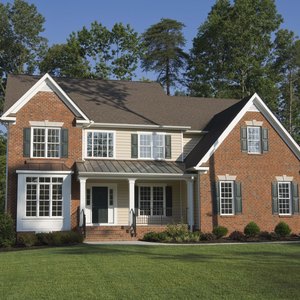
You may not realize it, but the term compound has a legal definition as part of the standard real estate lexicon today. A real estate compound is created when a family buys a parcel of land (usually several acres, but not always) and then builds one large main house that can accommodate group events and meals for the whole family, with at least one smaller house (usually more) built around the main house and outdoor common areas for recreational activities.
Tips
A compound is a parcel of land used for communal or multi-generational living. It typically comprises a large home with at least one, and possibly several further houses and communal facilities, all located within the same enclosure.
Understanding Family Communities
For families with the means to own a real estate compound with multiple separate homes clustered together, it can be a way of creating a private paradise. The word "compound" itself has a certain isolationist appeal. A compound can provide families with togetherness but also the privacy of not having to sleep under the same roof.
This living arrangement appeals to people who want to be close to their families. Wealthy real estate shoppers sometimes want to build more than one home on their property so their children or other relatives can live next door. But a real estate compound also can be as simple as having a main house with a mother-in-law cottage in the backyard.
Exploring Zoning Regulations
Some municipal zoning regulations prohibit having more than one home on a single lot or parcel. But families who really want to create a real estate compound and have the means to pay for it can overcome this obstacle in some cases by buying adjacent lots in a residential community. In some cases, homeowners may be able to add an extra dwelling onto the property by calling it a pool house. Pool houses are legal even in cities that prohibit compounds as long as no one sleeps in the pool house and no kitchen is installed in it.
Family Compounds and the Resale Process
Reselling a family compound can be even trickier than buying one in some cases. Real estate compounds are often designed with features specific to a particular family. Also, over time, family members die or decide they want to sell their individual cottages and homes on the property. This is one area where the family needs legal and financial planning advice before embarking on a communal living project. One option for owning a compound enclosure is through an LLC, which determines how much each family member chips in, who pays which bills, who receives rental income and what happens when and if the family unit breaks up.
Working With Multi-generational Homes
A new definition of the family compound has emerged in recent years, which includes single homes that are designed so that multiple families can live comfortably under one roof. This arrangement works well for families with aging relatives they want to keep near or families who need other relatives to help with child care. Some challenges that could arise will be deciding how to divide the cost of taxes, insurance and maintenance, especially if some family members are unable to pay an equal share.
References
Writer Bio
Tim Grant has been a journalist since 1989 and has worked for several daily newspapers, including the Charleston "Post & Courier," the "Savannah News-Press," the "Spartanburg Herald-Journal," the "St. Petersburg Times" and the "Pittsburgh Post-Gazette." He has covered a variety of subjects and beats, including crime, government, education, religion and business. He graduated from The Citadel with a Bachelor of Science in business administration.

